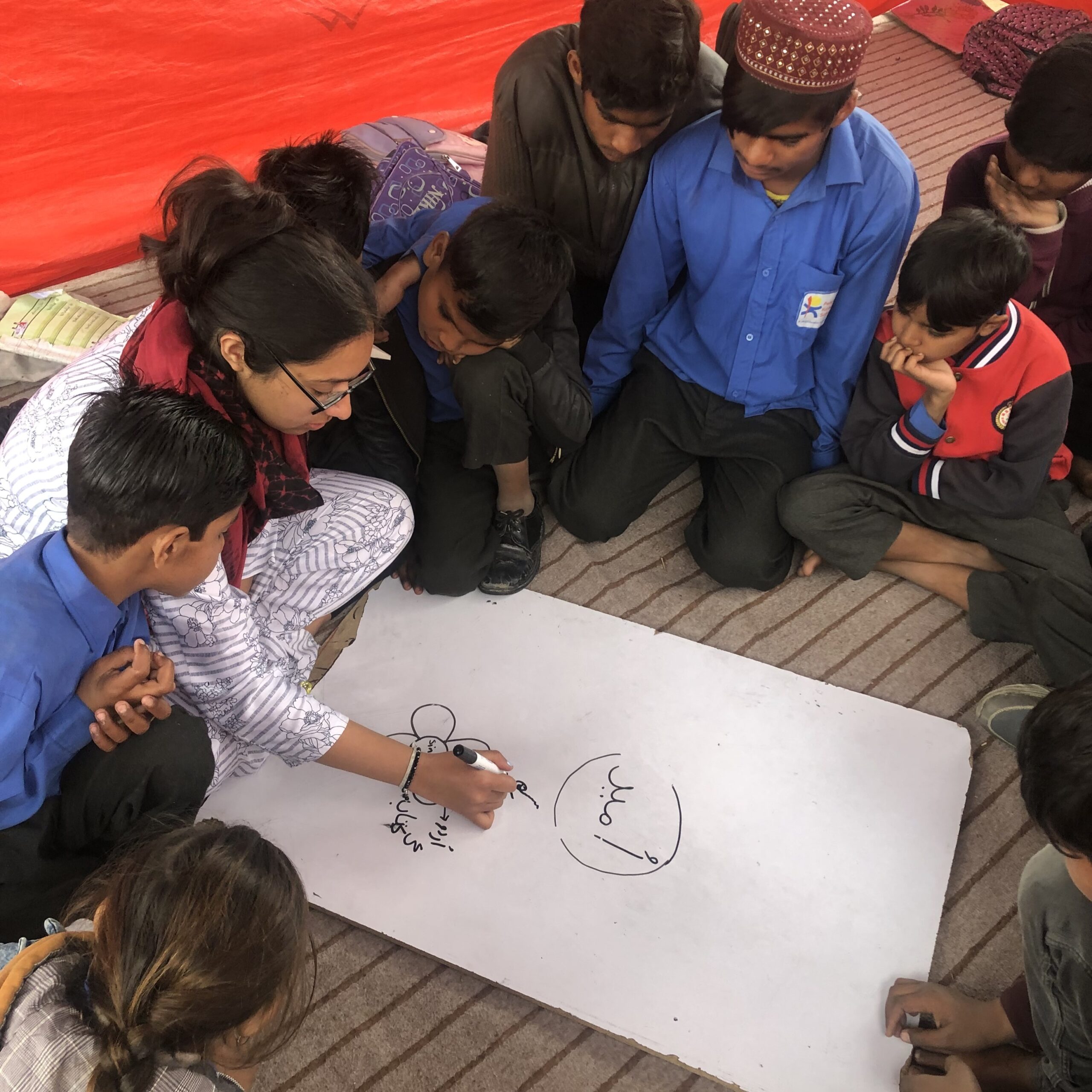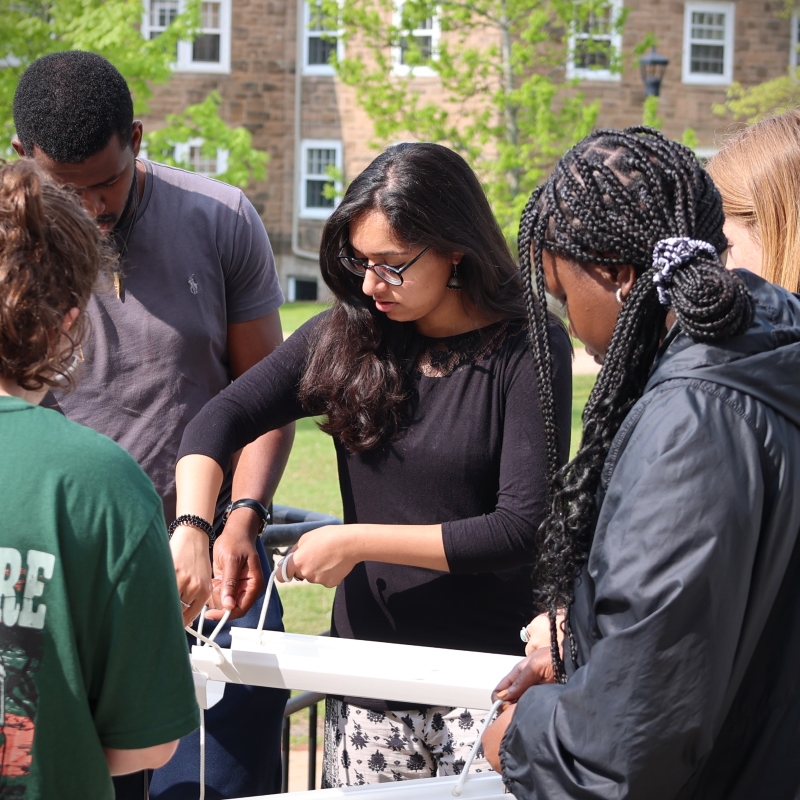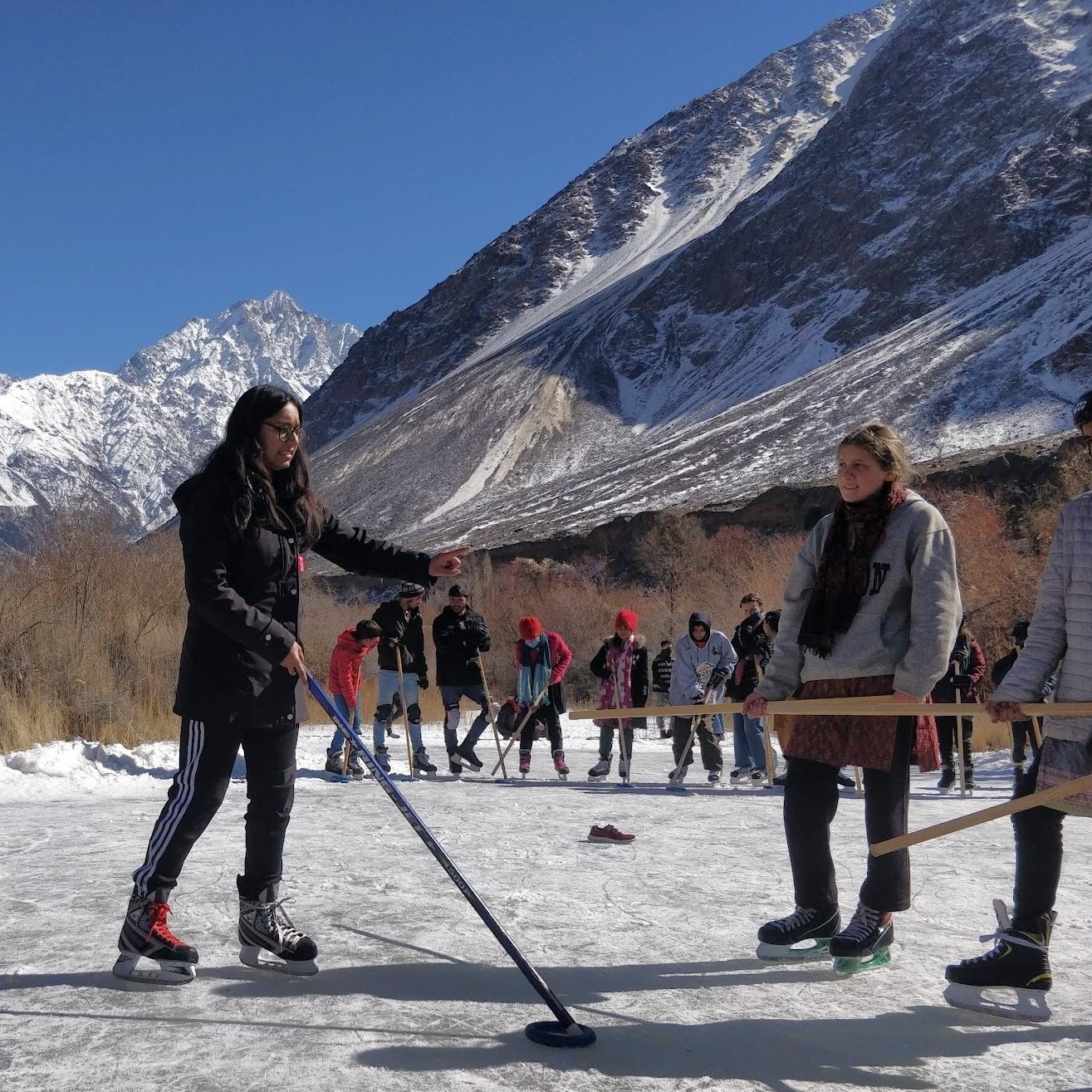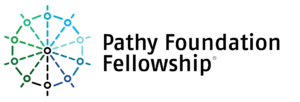Sara-Maya Kaba is using her Pathy Foundation Fellowship to support mental health in Pakistan. Through the Fellowship, Sara-Maya launched آواز (Aawaaz) which translates from Urdu to English as ‘sound’ or ‘voice’. She has been working with students and teachers to improve mental health outcomes through arts and sports activities.
“There are three main pillars of the initiative. One of the pillars is focused on mental health and arts education for students. The students I’ve worked with have ranged from Grade 3 up to university students,” Maya explains.
“The second is mental health and arts education for teachers and school leadership, including principals, coordinators, and teacher-mentors. Teacher training is essential to bring mental health awareness into the classroom. The third is mental health and sports, using winter sports – particularly women’s involvement in ringette – to increase mental health outcomes.”
If there is a teacher that can be more understanding towards a student who says they’re going through a tough time mental health-wise, or who can provide a more empathetic response in having these types of conversations than what is usually seen in this context, I think that will show success.
Sara-Maya has a connection to the country through her Pakistani heritage. When she travelled to Pakistan in 2019 for a job teaching English, she had an experience that would come to inspire her Pathy initiative.
“I witnessed one of the students having a panic attack, and it was heartbreaking to see the teachers’ dismissive reaction to her,” she explains. “It wasn’t the teachers’ fault; they just didn’t have a lot of exposure to what was happening and how to help. It really had an impact on me.”
Maya facilitated some workshops where she was able to learn more about the experience of the girls in the school.
“They talked about some of the traumatic things that had happened to them – cases of abuse, of rape, of depression, and of suicide. Every single person in that room knew someone who had taken their life. And so, I was thrust into this role of advocacy and support within a mental health capacity,” she explains.
“The desire to work towards a society where people don’t see suicide as the only viable option hasn’t left me.”
Maya returned to Canada to complete her degree at Queen’s University, and this experience motivated her to further focus her university studies on mental health, international development, and education. Now, as a Pathy Fellow, she is continuing this work at the community level.



Sara-Maya then formed a partnership with the Booni Environmental Academy and began the next phase of her initiative.
“The Booni Environmental Academy is an NGO that works for the promotion of winter sports and environmental conservation,” she explains.
It is through this partnership that Maya and her partners were able to launch Pakistan’s first-ever ringette program.
“My parents put me in ringette when I was four. It has really shaped who I am today in terms of the confidence it gave me, and in terms of the teamwork skills I learned,” she explains.
“In this patriarchal society we live in, ringette gave me the confidence to think ‘I actually can possess the same athletic ability as my male counterparts and can challenge them’. It gave me a lot of power as an individual and regarding my mental health – it gave me an outlet to channel my emotions.”
The goal was to provide mental health support and personal development alongside sport. Despite Sara-Maya’s experience and the Academy’s support, they hit a few roadblocks along the way.
“Climate change had a huge impact on the program – it changed when, where, how, and with whom we could run the program,” she explains.
Snow came late and the region was atypically warm.
“I was waiting for my last flight to go through, and the ice just melted again. We waited six weeks for there to be any sort of ice we could skate on,” Sara-Maya explains.
The group decided to travel further north in search of ice. Finally, through much persistence and many changed plans, Sara-Maya and the participants overcame transportation logistics and environmental conditions.
“It was inspiring for me to see the resilience of communities in the face of climate change and the barriers it causes.”
Through Aawaaz, Sara-Maya has worked with more than ten partners across Pakistan including the Notre Dame Institute for Education and Aga Khan University where she offers professional development sessions focused on mental health.
Facilitating in Communities across Pakistan
Sara-Maya worked in the northern part of the country for the first few months of the Fellowship’s community phase. During this time, she delivered mental health training for teachers and hosted participatory student sessions at a community-based school.
Sara-Maya then travelled to Islamabad to work with the Pehli Kiran school system (PKS). PKS are Montessori-based mobile schools brought directly into under-served communities and then moved as needed, such as when they are evicted by authorities.
“They are a slum or squatter settlement-based school system. Their schools are sheds – they are four poles and a tin sheet on the top and then it’s completely open, allowing them to relocate,” Sara-Maya explains. “There were some days when my classroom was an open field and there was no shelter at all from the elements.”
After months of honing her program design and facilitation skills, Sara-Maya had to suddenly adapt her approach to fit the educational context of the youth she was working with.
“In teachers’ college, they teach you to give students multiple ways to represent their learnings which are confined to drawing or oral presentations if writing isn’t their strong suit. That makes sense in theory, but it just did not work for these kids because of late entry into schooling and challenges with literacy,” she explains.
“I had to take what I know about the kids, about my content, and arts-based mental health education, and turn that into game-based learning and physical activity. It was such a challenge, but so much fun and just so rewarding to see a completely new spin on the content.”
Learn more about Pakistan’s first ringette program here:
Stories of Change
Despite being with each school or organization for only a short time, Sara-Maya is already seeing the impact of her work. During a session in November, Maya worked with a group of students that included twin sisters whose mother is a teacher at the school.
“I was back at the school in February to work with a different class and that mother came to me and said, ‘I have witnessed such a change in my two children after your workshop,” she shares.
“She was talking about how she now understood that health is more than just the way that we physically feel, but the way that we interact with people and how the types of relationships that we craft for ourselves also impact different domains of our wellness. Her kids started being intentional each day about focusing on their social, spiritual, and mental wellness and taking that learning to their younger siblings, too.”
This type of change not only impacts the family, and how they operate in society, but can also now be brought into the classroom through the mother’s teaching position.
At another school, Maya facilitated a session where the students were asked to craft a map of their life – the positive parts, and the challenging parts too.
“After the class, one of the students came up to show me her life map. She said she didn’t want anyone else to see it,” Sara-Maya explains.
“I asked her to tell me about it and she sat with me for an hour. She talked to me about the most difficult challenges she was facing. There were so many incredibly difficult things that she hadn’t disclosed to anyone before and it all just kind of came out in one sitting.
“It shows that giving people some kind of creative outlet to express themselves and the space to do that can lead to people finally feeling comfortable to share their stories and appreciate their own capacity for resilience.”
The Future
As the community phase of the Fellowship draws near, Sara-Maya and her peers will return to Coady Institute for ‘debriefing’ where they will evaluate outcomes, reflect on personal and professional growth, and plan the next steps of their journeys.
Sara-Maya says that success will be reflected in the longevity of the relationships she’s built with her partner organizations, and also in the change that happens within those organizations.
“If there is a teacher that can be more understanding towards a student who says they’re going through a tough time mental health-wise, or who can provide a more empathetic response in having these types of conversations than what is usually seen in this context, I think that will show success,” she explains.
“I’m an artist. Arts very much inform my view of the world and my understanding of what expression, education, and existence look like,” she adds. “So, if there are teachers, parents, or students that have been inspired to continue some of the arts that they put on the side (because they haven’t had the space or time, or haven’t seen its value), if they pick that up again and continue, I think that would also be success.”
Sara-Maya says the overall goal is “to work towards a world where there is no need for the Aawaaz program or similar initiatives because mental health challenges would no longer carry the same degree of stigma”.
Are you a graduating student from UOttawa, McGill, Carleton, StFX, Bishop’s, or Queen’s University? You may be eligible to apply.
To learn more about the Pathy Foundation Fellowship, visit pathyfellowship.com

